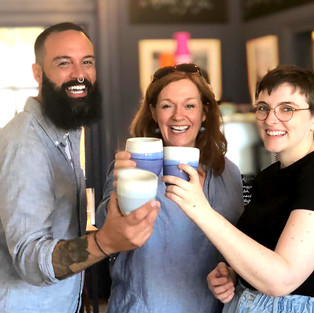There's No Place Like Hove – food and drink editorial for The Argus
- Nick Mosley
- Jul 11, 2019
- 5 min read
Updated: Jul 19, 2019
The food and drink scene of Hove has seen a renaissance in recent years. Nick Mosley talks to some of the movers and shakers that have helped turned Hove into a quality gastronomic destination.
When it comes to food, Hove has always been the poorer cousin of Brighton, which is no surprise when the core of the city welcomes over 9.5 million tourists a year. Whilst it has been easy to get a pizza or takeaway from one of Hove’s many outlets, a quality dining experience has been traditionally been restricted to a handful of gastropubs. In recent years, the likes of The Foragers and The Ginger Pig have been joined by a glut of restaurants, cafés, bars and food retailers who are offering not only a quality dining experience, but also one that is accessible to every budget and taste.
Kate Alleston, co-owner of Market Restaurant and Bar on Western Road, has operated a restaurant in Hove for over a decade with her business partner Neil Mannifield and has experienced the ups and downs of trading in the area over the years.
“I think people really enjoy going out in a neighbourhood these days, as opposed to being in the midst of the hectic city”, said Kate. “It has led to more and more forward-thinking independent businesses to pick Hove. Hove now boasts the city’s two 3 AA rosette restaurants – Etch and The Little Fish Market – as well as a number of really good, high quality modern restaurants, and the odd great bar too, so people can enjoy a quality night out in a nice environment”.
Lisa Green of Treacle & Ginger café on Church Road agrees: “The growth of the city has meant that Hove has a more mixed demographic and has become a more vibrant interesting place to live. Businesses now feel more confident that the area can sustain them, and consumers are looking for greater choice and quality in the local area”.
Customer loyalty and retention is a key benefit of trading in Hove, said Louise Tamadon-Nejad of The Flour Pot Bakery.
“We have a hugely loyal following of regular customers, which offers opportunities for word-of-mouth endorsements”, said Louise.
The expansion of the Hove food scene has been heavily influenced by the pressures on commercial space in Brighton. James Thomson of recently opened Wild Flor on Church Road reflects that the current poor state of the high street in central Brighton was a strong reason for him to choose Hove for his new venture.
“There are so many empty units in the centre of town, which when combined with ever-increasing rents, made that location very unappealing to us when we were looking to open Wild Flor”, said James. “Duke Street is the worst example of this currently with – at times – over a dozen closed units. Also outside of the city centre, there are larger spaces for dining rooms allowing ground floor dining, rather than splitting over several floors or rooms”.
Sam Pryor of Fourth & Church agrees that the cost of operating on a busy high street is prohibitive to restaurants. Liquor licensing is also a problem for quality restaurateurs, in terms of profitability.
“Licensing laws have been relaxed and there has been an acknowledgement that these need to evolve if the high street is to survive. People with more money and cosmopolitan dining habits are moving down from London. Hove is a quieter and calmer place with an older and wealthier demographic and that is more conducive to quality.”
Louise from The Flour Pot Bakery also thinks liquor licensing is a factor in new businesses opening in Hove rather than central Brighton: “It is potentially easier to get a license in Hove – the restrictions on gaining new licenses in the central Cumulative Impact Zone will surely put new businesses off”.
Hove was the ideal location for award-winning chef and restaurateur Steven Edwards of Etch.
“For us locating in Hove was about space and having a separate delivery entrance and being more accessible for guests to come from – potentially – outside of the city”, said Steven. “Parking is also a lot easier and less expensive. Being in Hove we also get the positives of a city with good deliveries and companies to choose from, and still be relatively accessible for guests.”
However, Steven highlighted the challenges for hospitality and retail businesses in the city centre, and what gives Hove the edge.
“I think parking is where we win in Hove against Brighton. We are a short walk from the station and have free on-street parking after 6pm. Even on the seafront we have parking for £5.50 for 24 hours”.
Mat Hudson of The Connaught on Hove Street thinks that in terms of on-going trade, Hove is definitely the place to be. Businesses in Hove feel a great sense of loyalty from their customers, which is reflected in repeat business.
“The challenge of being in Hove, rather than Brighton, is also a benefit. We don’t need to rely on passing trade and the unpredictable weather. The locals keep the community vibrant”.
Kate Alleston of Market Restaurant and Bar agrees: “We've definitely felt quite forgotten about at times, as if Hove doesn’t somehow exist. Now we feel like being in Hove is the best to place to be. It's quite a turnaround. I think the greatest benefit has always been, and will always be, the lovely clientele that you get to know so well, and often become friends with. It's what's always been the thing that has been most fulfilling for me”.
Hove’s restaurateurs are very supportive of each other, and understand that what is good for all.
“The Ginger Pig, of course, has for a long time been a benchmark for quality”, said James from Wild Flor. “And Etch has given Hove national recognition and has – it seems – successfully sustained a clientele of fine dining regulars”.
Restaurateurs are however critical of the way that Hove is marketed by the city’s tourism department.
“I still feel that media is very much focused on Brighton which means tourists continue to flock to the city centre, unless they've really done their homework”, said Kate of Market Restaurant and Bar. “Hove is still thought of as being on the outskirts by too many, not as part of the city’s whole, which – of course – it is.”
James from Wild Flor thinks that with structural changes to the tourism economy of Hove, the knock-on effect for restaurants will only be positive.
“I think what Hove missing is another couple of really good hotels – The Ginger Pig hotel rooms are some of the best in the city but there isn't much else in Hove”, said James. “With quality accommodation, Hove will really become its own destination”.
Without doubt, there is an overriding sense of positivity from hospitality businesses in Hove right now. The area is maturing and food businesses are cautiously positive about the future and the collectively supporting each other.
“Hove has always had an air of affluence”, said David of La Cave à Fromage. “Certain parts of Hove have a disposable income and – if you are in that demographic – the question is would you rather have Friday or Saturday night in the city centre, or a more relaxed night in a quiet corner of Hove”.
Louise from The Flour Pot Bakery concurs: “Hove presents an attractive and safe place to dine out, for families and people who live in the area, away from the busy and more crowded central Brighton.”
“If I was to summarise Hove’s food scene in three words then I’d say ‘Better Than Brighton’”, joked Steven Edwards of Etch. “But seriously, both locations have very different demographics but neither is better than the other. I think Brighton and Hove compliment each other nicely”.















Comments